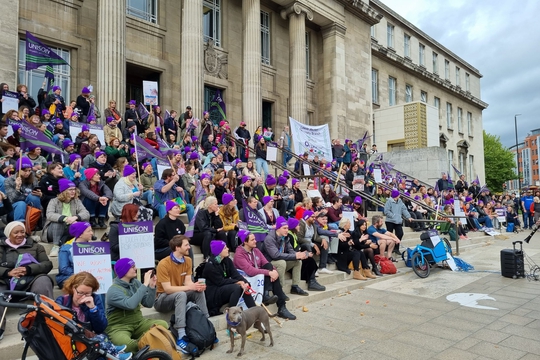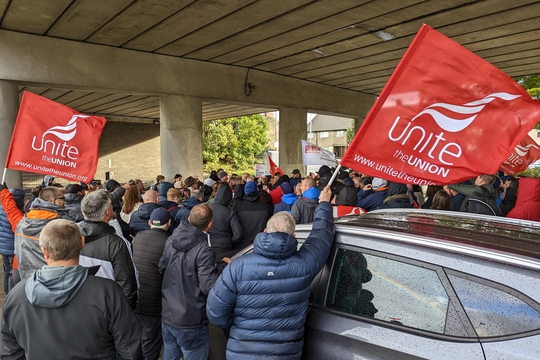Strike Report from a Higher Education Worker
by
Anonymous HE worker
October 7, 2022
Featured in Hot Strike Summer: View from the Picket Line (#15)
A report from a non-academic higher education worker involved in the on-going strike action by UNISON members.

inquiry
Strike Report from a Higher Education Worker
by
Anonymous HE worker
/
Oct. 7, 2022
in
Hot Strike Summer: View from the Picket Line
(#15)
A report from a non-academic higher education worker involved in the on-going strike action by UNISON members.
What are the reasons for strike action?
This strike is over pay. It comes as the latest development after several years in a row where UCU, the union representing our academic colleagues, have been taking action over issues including pay and pensions, while non-academic staff organised in Unison have been rejecting the same pay offers, but mostly struggled to reach the threshold required for strike action.
In the previous round of strikes, striking UCU branches were eventually joined by Unison taking action at ten universities, whereas this time around there’s a larger (but still not huge) number of Unison branches striking while UCU are still balloting.
How would you describe your strike tactics?
Rather than organising action solely through the branch committee, we’ve established a new strike committee for this dispute, which has been a big success. Sadly, not every rep is interested in organising strike action, and this has let us bring in new activists who’ve been much more energetic, while less motivated people who might hold formal positions in the branch haven’t been involved in the strike committee.
We’ve had strong pickets so far. Since a university campus is a huge workplace, we’ve got a lot of entrances to cover, so our numbers have been split up for most of the day, with strikers covering different points at different times - starting out with a strong presence at the buildings where cleaners and domestic staff start their shifts in the very early mornings, then spreading out to cover the places where more office-based staff work as the morning goes on, and then all regrouping at a central point right as the pickets finish so we can all see our collective strength. We’ve also maintained a strong visible presence throughout at the point where the university is most visible from a major road, to maximise support and awareness among the wider public. We’ve not organised a formal rally this time round, because there could be a long fight to come and we want any further action to feel like an escalation, but we did organise a collective breakfast for picketers which served as a sort of informal rally.
We have had supporters coming down - as a university, the two obvious sources of support are our academic colleagues in UCU and our students, but we have also had some support from left groups and the wider union movement. The strike action so far, being right at the start of term, has probably been good in terms of causing maximum disruption to the university, but unfortunate in terms of students not having much time to organise support; so we’ll see if student support is bigger and more organised next time round.
On a positive note, our branch membership has grown at a fantastic rate over the course of this dispute, it turns out that workers really are more interested in joining unions that are doing something visible to fight for their interests than ones that aren’t doing much.
One tricky issue is the question of working from home, which is an option for some workers but not all of them. Obviously we can’t really effectively picket out a worker who stays home and just logs in instead, so that’s a question the movement as a whole will have to grapple with.
What comes next? What avenues are there for escalation?
Honestly, we’re in a really tough position - our pay negotiations are conducted at a national level with the employers’ association UCEA, so getting a few really strong strikes among non-academic staff at a local level isn’t going to do much to scare the bosses nationally.
The difference in timescales between our dispute and the UCU ballot is really frustrating, because a lot depends on what they end up doing. They’ve decided to go for an aggregated ballot this time, which means it’s all-or-nothing: if they get over the 50% threshold they’ll have a mandate for action across all their members, if they don’t then no-one will. I’d love to be wrong about this, but I’m worried that could be a mistake. Certainly, we can win a lot more if our strikes are joined up with the entire UCU membership in our sector, but if we end up fighting alone then we’ll be in a much tougher position.
At Liverpool John Moores University, the branch reached the threshold for strike action, but ended up deciding not to strike after accepting an improved offer of a one-off cost-of-living payment of £1,300. We’d like to win this dispute nationally, but if that looks impossible at the national level, then we need to be looking at what we can win from our employers locally.
There are already a few branches, like Birmingham and Dundee, that have opted out of national bargaining altogether and just bargain directly with their employers at a local level. That prospect might start to look more inviting to other strong branches if we can’t win nationally.
How does this strike relate to struggle more widely?
As above, the biggest immediate issue is the Unison/UCU divide. Unite and GMB also represent some staff but have less presence, and there’s also EIS but they only operate in Scotland. After a number of strikes where our UCU colleagues have been picketing while we carry on working as normal, having the situation reversed is an interesting twist. However, it’s no substitute for the power we could have if we balloted and struck together.
If we could agree a joint timetable, it would mean that we’d know exactly where we stood as soon as the ballots closed, rather than having some Unison branches charging ahead in isolation hoping for UCU reinforcements that may or may not come. It would also open up the possibility for a more powerful joint ballot campaign. If cleaners, receptionists and lecturers are all fighting against the same pay offer, there’s no reason why they shouldn’t be campaigning alongside each other.
Our branch has also been involved in solidarity with other unions fighting their own disputes off campus, and it’s hard to say how far the current mood among our members is due to our own efforts, and how far it’s generated by the current strike wave.
Any additional notes?
In some ways, trying to take effective action has felt like a battle with Unison’s official structures as much as with the employer. There are all sorts of points that I could complain about, but just to pick one particularly glaring one: the strategy agreed by the Service Group Executive, our elected leadership for the Higher Education sector, was to hold a ballot and then immediately reballot those branches that didn’t get over the 50% threshold. This isn’t happening, apparently because the union nationally wants to concentrate on balloting in Health, and then may or may not consider reballoting in HE after all the other sectors are sorted out. For members in those branches who got close to the line but not over it and were expecting a reballot, I can’t imagine how frustrating it must be to have to sit this round out because their own union doesn’t seem to consider them a priority.
author
Anonymous HE worker
Subscribe to Notes from Below
Subscribe now to Notes from Below, and get our print issues sent to your front door three times a year. For every subscriber, we’re also able to print a load of free copies to hand out in workplaces, neighbourhoods, prisons and picket lines. Can you subscribe now and support us in spreading Marxist ideas in the workplace?
Read next

Strike Report From a Postal Worker #1
by
Anonymous postal worker
/
Aug. 29, 2022

